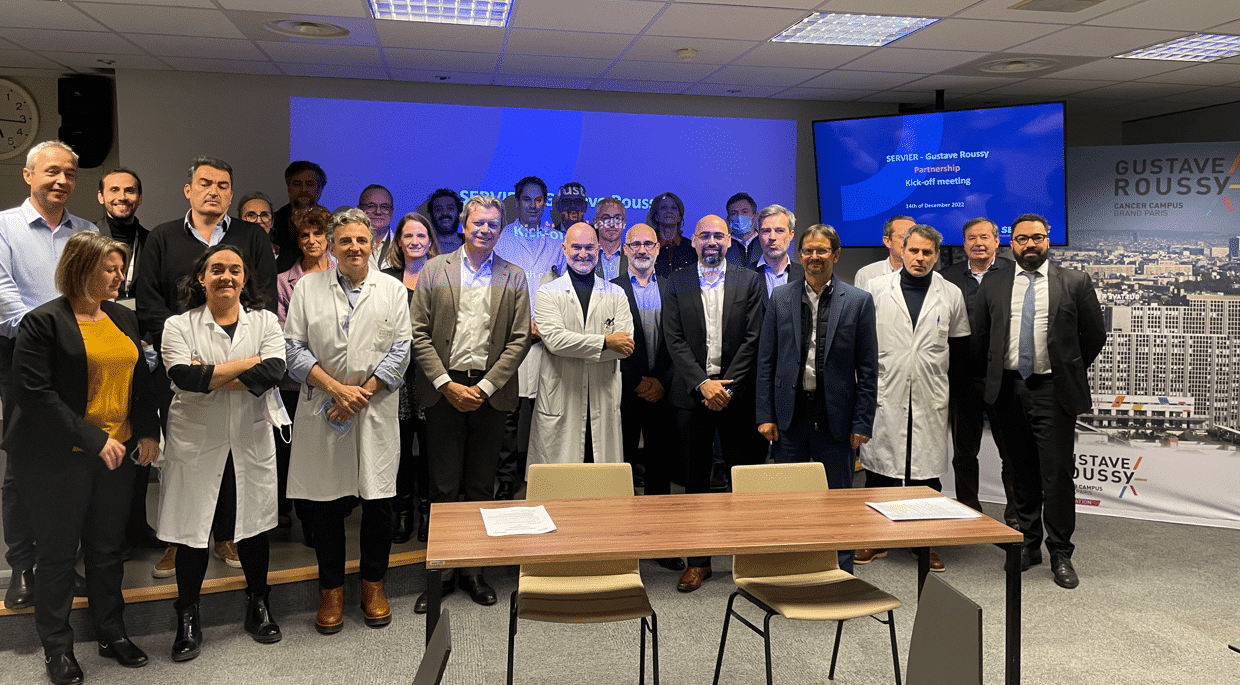“To radically change the way cancer patients are treated will only be possible if there are very close partnerships between the pharmaceutical industry or biotechs and academic research,” said Professor Fabrice Barlesi, CEO at Gustave Roussy. The teams at the Servier laboratory and researchers from Gustave Roussy are faithful to this philosophy and will together carry out 5 initial projects in adult and pediatric oncology, as a result of the framework agreement signed on December 14, 2022 between the two cancer specialists.
These five projects relate to indications of interest for Servier that Gustave Roussy considers present a strong unmet medical need. These projects concern both the development of new preclinical models and the identification of predictive biomarkers designed to optimize therapeutic management. “This partnership is very wide-reaching as it has a number of dimensions, in oncology and hematology, in both adults and children,” said Prof. Angelo Paci, Oncology and Immuno-oncology Program Leader at Servier. “We involve fundamental, translational and clinical research teams in order to ensure that cancer treatments that are difficult to treat are available for patients more quickly.”
The agreement is also supported by early-phase clinical trials with innovative molecules from the Servier oncology pipeline that will be led by Gustave Roussy. Gustave Roussy is the leading European oncology center and third worldwide, it has the largest early-phase trials unit in Europe. Based in Villejuif, just outside Paris, it handles almost 50,000 patients every year and is developing an approach that integrates research, care and training.
Over the last 5 years, the Servier laboratory has resolutely shifted to cancer treatments and research, and today allocates 50% of its R&D budget to oncology, with 38 projects currently in progress.
This collaboration has very concrete objectives: “To discover drugs and/or new treatments for patients,” Prof. Barlesi said.
“The framework agreement we are signing today with Servier is strategic for patients living with cancer. It is the culmination of a long-standing collaboration that will eventually be reflected in the Paris-Saclay Cancer Cluster. The first research projects in hematology, immuno-oncology and pediatrics illustrate the scope and momentum that this agreement bring to our collaboration,” Prof. Fabrice Barlesi, CEO of Gustave Roussy.
“This collaboration allows combining the expertise of Servier and Gustave Roussy, with the common objective of initiating ambitious R&D projects for the purpose of developing therapeutic innovations targeting resistant cancers, such as certain acute myeloid leukemias in adults, and treatments targeting cancers with high unmet needs, such as certain brain tumors in children,” Prof. Angelo Paci, Oncology and Immuno-oncology Program Leader at Servier.
The framework agreement forms part of the dynamic of the Paris-Saclay Cancer Cluster, a center of excellence of global dimension dedicated to oncology, that is being created alongside Gustave Roussy. This strategic project driven by private and public players (Sanofi, Gustave Roussy, Inserm, the Institut Polytechnique de Paris and the University Paris-Saclay) is designed to speed up the development of innovation in oncology, working as closely as possible with patients.
The opening of the Servier R&D institute in 2023, within the world-class Paris-Saclay innovation cluster, will add a new dimension to this strategic partnership.
This partnership also promotes the future of medicine, that needs to become “less and less empirical and more and more predictive,” said Prof. Barlesi. “We must personalize the treatment for each patient, in line with their illness and their condition. This involves understanding the mechanisms of the illness and identifying the biological targets that need to be activated.”
In recent years, Gustave Roussy has signed partnerships with a number of manufacturers, both in France and internationally (Japan, USA,…) in particular with Sanofi, Daiichi Sankyo and AstraZeneca. “There is very little chance that the best drugs of tomorrow will be exclusively the result of academic or industrial research. These partnerships give us a better and faster chance of success,” said Prof. Fabrice Barlesi in conclusion.
The 5 projects launched in connection with the framework agreement between Servier and Gustave Roussy:
– A project that aims to carry out translational studies (Biomarker-driven) to better understand why there is resistance to existing treatments in adults and sometimes relapses, in acute myeloid leukemia (LMA or AML), around Tibsovo® (a Servier drug designed to treat LMA with a mutation of isocitrate dehydrogenase-1 (IDH1)). In collaboration with Prof. Stéphane de Botton, Head of the Hematology Department at Gustave Roussy.
– A project to reformulate chemotherapy drugs in certain pediatric sarcomas for which existing drug formulations are not suitable – galenic forms suitable for adults are difficult to administer to children given the size of the tablets, and the dose is difficult to adapt to the weight of the child. The project consists in developing drugs suited to children by 3D printing, a technology that is already in place in Gustave Roussy. Servier provides the active ingredient (with all the safety characteristics of a finished product). This project is implemented in collaboration with the Department of Cancerology for Children and Adolescents and the Department of Clinical Pharmacy of Gustave Roussy.
– A project that relates to the development of organoids, ex-vivo models, from the same patient, produced from tumor cells and immune cells, for brain tumors in children (the tumor and its environment are reconstituted outside the body). A unique expertise specific to Gustave Roussy has been developed by Prof. Florent Ginhoux (UMR 1015 INSERM). These models ought to allow new therapeutic targets to be identified in these pathologies and, in future, to identify existing drugs that could act on this target, or develop new therapeutic solutions.
– A project that consists in sharing Servier and Gustave Roussy patient tools and databases (anonymized in accordance with the GDPR – General Data Protection Regulation) by using artificial intelligence to identify new therapeutic targets and develop new treatments. This project is implemented in collaboration with Prof. Fabrice André, Director of Research at Gustave Roussy.
– A project to design innovative early-phase clinical trials including translational medicine, and in particular biomarkers, to accelerate the development of Servier drugs in oncology and immuno-oncology (precision medicine). Biomarkers allow precise targeting of the population that could fully benefit from treatment in the context of a clinical trial. This project is implemented in collaboration with the oncologists/investigators from the Department of Therapeutic Innovation and Early-Phase Trials (DITEP).







